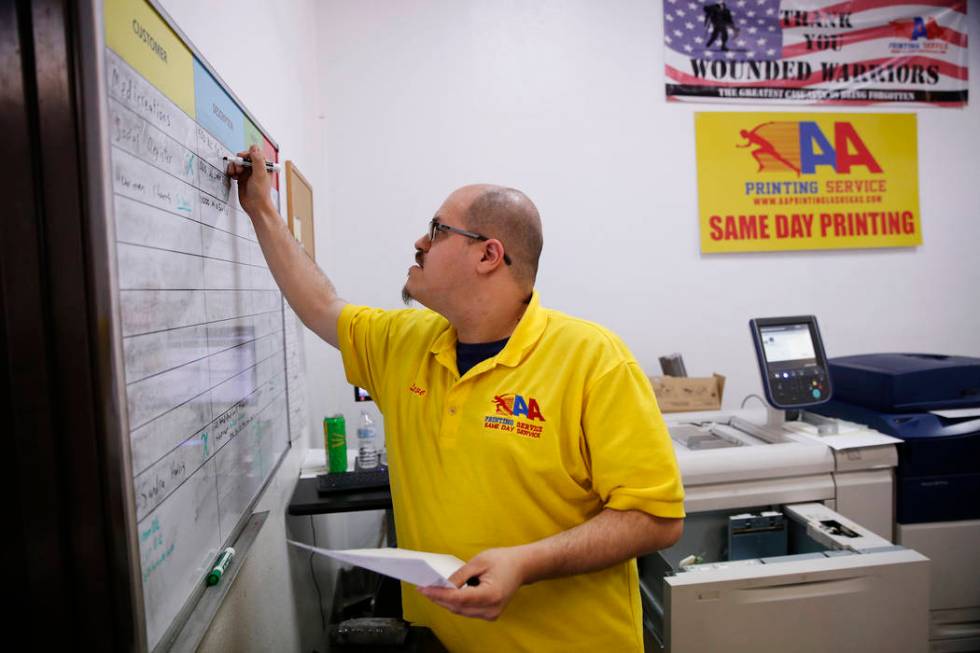Small Nevada businesses struggle to find qualified candidates

One of the starkest differences California native Lydia High noticed when she moved to Las Vegas 15 years ago was in her hiring pool.
Back in Los Angeles, most candidates could easily check off all the required skill sets for her accounting business. Her biggest concern was finding someone who would fit in with the company’s environment.
“It was very difficult to find qualified employees.”
It still is, she said.
High and many other small-business owners in Nevada have hit a wall finding employees with the right skill sets. A 2018 survey by Nevada State Bank and Applied Analysis found more than two-thirds of businesses find it somewhat or very difficult to recruit qualified candidates. The state’s education system and a lack of economic diversification may be at fault, experts say.
Jeff Grace, chief executive officer of information technology service company NetEffect, said it’s been increasingly difficult to hire qualified candidates in recent years amid a robust economy. His company currently has 23 employees and three job openings.
“It’s my belief that small businesses have to adapt in the good times just as they have to adapt to the challenging times,” he said. “It’s more challenging finding qualified candidates just because the economy is doing better. There are more options available for candidates.”
Nevada had the nation’s highest job growth rate in 2017, according to the U.S. Labor Department. While this is a sign of a burgeoning economy, it can lead to a disproportionate labor market — one with more job openings than qualified candidates.
“New and existing businesses are competing over the limited number of employees,” said Jeremy Aguero, principal analyst at Las Vegas-based Applied Analysis. “As the economy grows, that demand for skilled workers gets more and more intense.”
Today, about 26 percent of the state’s economy is in the leisure and hospitality industry, according to the Nevada Department of Employment, Training and Rehabilitation.
The state has been making efforts to diversify the local workforce’s skill sets. Health care, technology and advanced manufacturing are high-growth, high-wage sectors that have been highlighted by the Governor’s Office of Economic Development so far.
Stacey Bostwick, workforce development program coordinator for the GOED, said most of its funding has gone toward advanced manufacturing.
“Advanced manufacturing was a huge need for our state, just because we didn’t have the huge manufacturing base. So we really didn’t have the programs to train,” Bostwick said. “I feel like we’ve got a lot of momentum and a lot of activity happening in that space, so now let’s expand it into other areas.”
Focusing on education
A majority of Nevadans may be underqualified for jobs in the sectors the state is trying to expand.
Nevada ranked 45th in the nation in educational attainment in 2016, with only 23.5 percent of residents holding a bachelor’s degree or higher, according to the U.S. Census Bureau. The national average was 30.3 percent.
This is one issue that is going to get worse, not better, over time, according to Mary Beth Sewald, president and CEO of the Las Vegas Metro Chamber of Commerce. One study from Georgetown University found that 65 percent of all jobs in the economy will require some form of postsecondary education and training by 2020.
Busines organizations — including the Las Vegas Urban Chamber of Commerce and the Las Vegas Metro Chamber of Commerce — have turned their focus to shoring up the state’s education system to help expand the workforce’s skill sets.
“Education is one of the biggest concerns for us,” Sewald said. “We’ve really had a focus on K-12 education for many years, and I feel it would better prepare students for the needs of the workforce.”
Ken Evans, president of the Las Vegas Urban Chamber of Commerce, said it has been trying to expose K-12 students to different career industries through career days, guest speakers and field trips to businesses. For post-secondary residents, he suggests bringing in speakers to colleges or offering more internship and apprenticeship programs.
“We need to expose them to those different career industries as early as possible in their educational experience,” he said, adding that there are more industries out there than what was historically available because of new technology and services.
Employers’ role
But there could be more underlying issues than just lack of skills, Bostwick said. Some companies may have issues finding the right recruitment strategy, and others could be using inefficient ways to assess candidates.
“If all you’re using is a resume or an application, that doesn’t tell you a whole lot about somebody’s skill set,” Bostwick said. “It doesn’t even tell you how successful they’ve done the job before.”
John Pinnington, president and CEO of Las Vegas-based AA Printing Service, plans to hire six more employees to join his five-person staff in the upcoming months. He said he’s had difficulties hiring in the past, and he is watching other small businesses struggling with the issue today. He said a large number of small businesses don’t focus enough on training new hires and teaching them the skills that make them qualified.
“When you’re hiring a new employee, you can’t expect them to walk in the door and know what your dream is,” Pinnington said. Without investing time in employees, he said, businesses can face higher turnover rates and lose customers.
Bostwick recommended employers connect with programs that support employment pipelines, such as Workforce Connections.
“There are so many amazing things here and so many people who are working to move Nevada forward,” she said. “I really wish people would take the positive stuff, the amazing programs that are coming out of high schools. The momentum is there.”
Contact Bailey Schulz at bschulz@reviewjournal.com or 702-383-0233. Follow @bailey_schulz on Twitter.